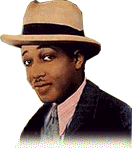and the Jungle Band

![]() n 1928, the two leading writers in jazz were Fletcher Henderson (or, more accurately, Don Redman, who was actually arranging most
of that band's material in those years) and the rapidly-rising Duke Ellington. Although a few musicians (Ben Webster, Rex Stewart) worked in
both bands, the two approaches could not have been more different. Henderson and Redman established the basic pattern of almost all big bands
to come by breaking the ensemble down into sections - brass, reeds and rhythm - and having these conflict and contrast with one another: saxes
n 1928, the two leading writers in jazz were Fletcher Henderson (or, more accurately, Don Redman, who was actually arranging most
of that band's material in those years) and the rapidly-rising Duke Ellington. Although a few musicians (Ben Webster, Rex Stewart) worked in
both bands, the two approaches could not have been more different. Henderson and Redman established the basic pattern of almost all big bands
to come by breaking the ensemble down into sections - brass, reeds and rhythm - and having these conflict and contrast with one another: saxes
 against trumpets, one section answering the other. While Ellington also used contrast, he became known for instilling a more wholistic kind of
harmony between the various factions, blending them together in sensuously smooth or dissonantly jarring voicings (a direction reinforced when
the great composer Billy Strayhorn joined the team in 1938) atop an equally idiosyncratic sense of rhythm. "The Mooche," a clear product of
Ellington's "jungle band" phase, posits Arthur Whetsol's growling trumpet over a moaning threesome of blue clarinets.
against trumpets, one section answering the other. While Ellington also used contrast, he became known for instilling a more wholistic kind of
harmony between the various factions, blending them together in sensuously smooth or dissonantly jarring voicings (a direction reinforced when
the great composer Billy Strayhorn joined the team in 1938) atop an equally idiosyncratic sense of rhythm. "The Mooche," a clear product of
Ellington's "jungle band" phase, posits Arthur Whetsol's growling trumpet over a moaning threesome of blue clarinets.
"Black and Tan Fantasy," one of Ellington's earliest recorded standards, shows the Maestro, in his early "jungle band" phase, working with the same funereal material as "Dead Man Blues." The main theme is phrased by the brass section, led by growling trumpet of King Oliver disciple Bubber Miley, which is followed by a lighter secondary theme expressed by sweet sounding alto saxophonist Otto Hardwick. After solos by Miley, Ellington's own piano (sounding much the way it would up until his death in 1974) and equally-growly trombonist Tricky Sam Nanton, Miley returns to conclude the piece with a solo that's actually part of the composition, which goes out with a quote from Chopin's Funeral March.
Ellington's music boils down to two essential elements in the human character which were especially felt by 20th Century Americans, and he expressed
them so keenly that by his '40s, Ellington had become the greatest composer of both the century and the country. When Ellington, born in Washington DC
 in 1899, came to Harlem in 1922, New York blacks had two expressions which they used to describe each other's attitudes, "dicty" and "haincty."
in 1899, came to Harlem in 1922, New York blacks had two expressions which they used to describe each other's attitudes, "dicty" and "haincty."
Ellington applied the first term in a 1929 tune called "The Dicty Glide," as well as throughout a comparitively restrained mood piece like the versions of "Sophisticated Lady" and "Azure" heard here. "Dicty" meant cool, laid back, using emotions but controlling them very carefully. The other term implied an individual just out of the back woods, a loose and low down kind of mood, full of excitement and where one doesn't hold much of anything back, as heard throughout "Don't Get Around Much Any More."
Introduction
The Great Ellingtonians
Ellington The Songwriter